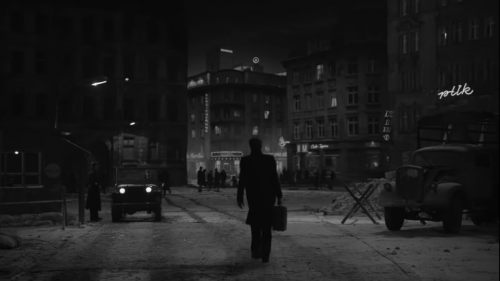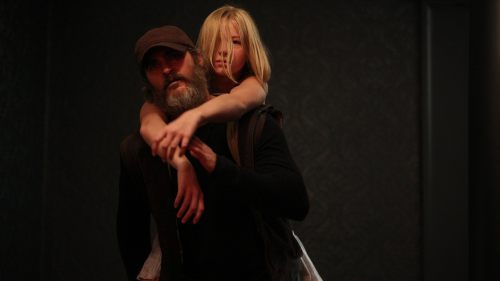Wake Up, Joe: On YOU WERE NEVER REALLY HERE
“But they beckoned; leaves were alive; trees were alive. And the leaves being connected by millions of fibres with his own body, there on the seat, fanned it up and down; when the branch stretched he, too, made that statement. The sparrows fluttering, rising, and falling in jagged fountains were part of the pattern; the white and blue, barred with black branches. Sounds made harmonies with premeditations; the spaces between them were as significant as the sounds. A child cried. Rightly far away a horn sounded. All taken together meant the birth of a new religion.” - Virginia Woolf, Mrs. Dalloway
Spoilers for You Were Never Really Here and Manhunter.
In the city at night, Joe stakes out a house where a little girl named Nina’s been taken. He waylays an errand boy on the street outside, throwing him in the back of his rental car to interrogate him about the house’s security. Joe introduces himself: “I’m Mr. Rogers.” Fred Rogers once said: “For me, as for all children, the world could have come to seem a scary place to live. [ . . . ] There was something my mother did that I’ve always remembered: ‘Always look for the helpers,’ she’d tell me. ‘There’s always someone who is trying to help.’” Joe is a helper. Inside the house, “Angel Baby” plays. Security cam footage shows Joe taking his hammer to every man he finds.
Lynne Ramsay’s You Were Never Really Here, an adaptation of Jonathan Ames’s novella, is a film that deconstructs and subverts the conventions of samurai, noir, and modern crime films. Ramsay strips away idealized notions about machismo and violence and “having a code” by exposing her characters’ alienation, pain, and brokenness. It’s a reimagining of masculinity and the narratives that romanticize it, with Joaquin Phoenix’s Joe at its center. Joe lives with and cares for his aging mother (Judith Roberts), and he gets paid to rescue little girls from bad men, with John McCleary (John Doman) and Angel (Frank Pando) as his clients’ go-betweens. McCleary tells Joe about a new job: a girl named Nina (Ekaterina Samsonov) has been abducted. Her father Senator Votto (Alex Manette) asks Joe to bring Nina back and to hurt the people who took her.
Joe is complicated. His body tells his story: scars map his trauma, dangerous muscle lurks beneath softness, and, with one shoulder slightly larger than the other, he appears uneven. He seesaws between empathy and psychopathy, a broken human being who’s desperate for connection. He’s like a knight who’s lost his armor, or as filmmaker Lynne Ramsay explains, he’s “the opposite of a knight in shining armor. He can’t even save himself.” Joe might be a helper, but he hasn’t quite mastered it. And no one has ever helped him.
Joe was abused by his father, further traumatized by his experiences in the military and the FBI. Joe became fluent in his father’s violence and realized in his adulthood that, although his father was gone, the world still spoke his language - powerful men like Senator Votto and Governor Williams (Alessandro Nivola) continued to abuse the powerless. Joe even uses his father’s favorite weapon - “[he] was his father’s son, after all.” But the film spares us its actual violence, only showing us the aftermath, like broken glasses, blood spatter, a man with his throat slit or with mutilated hands. Sometimes it’s at a distance: when Joe rescues Nina, we only see the damage via grainy security-cam footage. Violence has never given Joe catharsis, so the audience is denied catharsis. The only exception to this rule is his self-inflicted violence, which is always explicit. He pulls his tooth out after getting shot in the face, he has suicidal fantasies, and he regularly asphyxiates himself with a plastic bag that stretches over his head like a death mask. Joe is one of his own victims.
Lynne Ramsay said, “I wanted to give the impression that this guy’s got broken glass in his head - shards rather than full explanations. Enough to piece things together about what happened to him.” We’re in Joe’s head, perceiving the world the way he does, experiencing the broken glass of his traumatic memories. The film is an expression of Joe’s mind, and the erratic soundscape of You Were Never Really Here belongs to him, a product of his PTSD, always jarring and cacophonous.
But the film isn’t always from Joe’s perspective. It begins with a blank image, underwater, Nina’s and Joe’s voices overlapping, counting down until the pain is over. When Joe finds Nina in the house’s “playground,” her POV takes over briefly - she’s semi-conscious and out of focus, Joe’s voice is muffled, but we hear her counting clearly. When Nina’s in the car with Joe, the soundscape seems normal for the first time, balanced, just rain and Jonny Greenwood’s beautiful, spare “Nina Through Glass.” Elsewhere in the score, Greenwood uses dissonant strings to give voice to Joe’s agonized mind; here, the strings are subdued, pretty, melodic. Nina doesn’t intrude into Joe’s world, she blends into it.
Joe seeks connection. Cinematographer Thomas Townend captures Joe in reflective surfaces: alone, with someone he’s killing, or with someone who’s been killed. He’s lonely in the frame. His rare connections resemble reflections: he sits across from his mother at the kitchen table, he sits across from Nina in the diner. Joe even tries to connect with the dying man (Scott Price) who killed his mother. Joe shoots him, but he also gives him his painkillers. He lies down next to him, another reflection. His childhood home is a haunted space, and so this is also a reenactment, an echo of the past: the wounded man crawls under the table where Joe’s mother used to hide from his father’s violence, and they sing together in the kitchen where Joe used to sing with his mother.
In a Michael Mann film, this scene would be romanticized. There would be a special understanding between the two men, a mutual respect, and it would be an honor for one man to die in the other’s presence. And in any other movie, a ‘bad guy’ dying in the presence of the ‘good guy’ would prompt him to give an oddly lucid confession. This man’s death is its own kind of confession - undignified and vulnerable. Incoherent, he conveys to Joe that Senator Votto wanted “out,” suggesting Votto was complicit in what happened to his daughter, and that Governor Williams now has Nina, his “favorite.”
Charlene’s “I’ve Never Been to Me” comes on the kitchen radio: “Hey, you know what paradise is / It’s a lie. A fantasy we create about / People and places as we’d like them to be. But you know what truth is? / It’s that little baby you’re holding, and it’s that man you fought with / This morning, the same one you’re going to make love with tonight. / That’s truth, that’s love. [ . . . ] Hey lady, I’ve been to paradise, but I’ve never been to me.” The dying man starts to sing, and Joe sings along with him. He holds Joe’s hand. The song seems to play just for them, men who have led disconnected, violent lives and now make one last desperate attempt at emotional honesty.
Joe takes his mother’s body to the lake, fills his pockets with stones, and walks into the water, intending to descend into the murk with her. We hear young Joe’s voice count down the seconds, adult Joe’s voice overlapping. When Nina’s voice joins his, Joe opens his eyes. A vision of Nina sinking to the bottom of the lake brings Joe back, and they swim to the surface together. It’s a turning point for Joe. When we first meet him, he’s just saved a girl named Sandy. He burns her photograph and throws away her necklace, erasing her from his life. But his priorities evolve as his world collapses around him. He loses interest in punishing bad men, and he starts to care about the girl beyond the job. Nina ultimately saves herself, and she saves him, too. This is a funeral, but it’s also a baptism and a rebirth.
On the train, Joe looks out the window, and then he sees Nina as if it’s his own reflection. He pictures what Nina’s been through, the first time he’s considered a girl beyond the task of finding her, the first time he’s imagined someone else’s trauma. In Michael Mann’s Manhunter, Will Graham hunts the serial killer Francis Dolarhyde, a man who represents Will’s own annihilative darkness. When Graham finally eliminates Dolarhyde, he excises this darkness. Graham’s salvation comes from killing someone, from killing something in himself, a destructive solution. Joe’s solution is restorative. Will Graham’s ability to empathize with monsters ultimately disfigures him in Thomas Harris’s Red Dragon. His empathy is a curse. But Joe chooses to identify with Nina, not the film’s monstrous men. Rather than erasing his own darkness, Joe finds salvation in reviving his humanity.
Joe rescued little girls because no one ever rescued him. But he inadvertently perpetuated his father’s violence. For Joe, violence isn’t cathartic, redemptive, or curative, it’s poison that only makes him sicker. Almost everyone in Joe’s life dies: Angel and his son, John McCleary, Joe’s mother. They are all, in a way, victims of his violence, collateral damage, and as he discovers their fates, he’s increasingly plagued by flashbacks. What helps Joe is connection, empathy, choosing to live for someone else. “It’s a beautiful day,” Nina says to Joe in the diner. Joe responds, “It is a beautiful day,” as if the thought occurred to him for the first time ever. Joe relives his memories on loop, anchored in the past, and though the trauma remains, by the film’s end, Joe and Nina finally take pleasure in the present, a rare moment of calm. Joe vividly dreams of killing himself when Nina leaves the table, but her return wakes him. Eileen Barton’s “If I Knew You Were Comin’ I’d’ve Baked a Cake” plays, and the hum of background conversation is pleasant - no more broken glass, cacophony, dissonant strings. Joe slurps his milkshake.
Joe lets go of the past in Governor Williams’s house. It’s a cleansing, an exorcism. He drops the hammer and weeps when he discovers Williams’s corpse in Nina’s would-be bedroom. In the study, he sees apparitions of his mother; his father, face covered, holding the hammer; young Joe in the closet, afraid. And then Joe finds Nina, sitting at the dinner table, a bloodied straight razor by her plate. She’s managed to vanquish her demons, and Joe kneels beside her, worshipful. The look on his face expresses concern, empathy, and awe. Nina says, “It’s okay, Joe. It’s okay.” Her reassurance transcends the moment. For Joe, it’s absolution. Lynne Ramsay said You Were Never Really Here is, “about the death of violence in a way.” It’s the end of a cycle of abuse, and a new beginning for Joe and for Nina.



